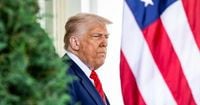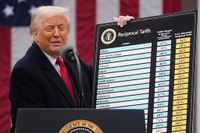President Donald Trump made headlines on Wednesday, May 7, 2025, by firmly stating that he would not lower tariffs on Chinese goods to encourage negotiations, despite speculation suggesting otherwise. This declaration comes as U.S. officials prepare for high-stakes trade discussions with Chinese counterparts in Switzerland this weekend, marking a significant moment in the ongoing trade war between the two nations.
Trump’s remarks were made amidst a backdrop of escalating tensions and economic uncertainty. As Treasury Secretary Scott Bessent and trade representative Jamieson Greer gear up to meet with Chinese Vice Premier He Lifeng, the stakes are high for both countries. This meeting will be the first senior-level dialogue since Trump implemented hefty tariffs on Chinese imports, which currently stand at a staggering 145%.
Earlier this week, on NBC’s Meet the Press, Trump indicated a willingness to eventually lower these tariffs, stating, “At some point, I’m going to lower them, because otherwise, you could never do business with them, and they want to do business very much.” However, he quickly contradicted this sentiment by asserting that "we're losing nothing" by maintaining the current trade standoff with Beijing.
Meanwhile, China has been proactive in its approach to the tariffs, reportedly compiling a list of U.S. goods that would be exempt from its own 125% tariffs. This move suggests a desire to ease trade tensions without making formal concessions, a strategy that could complicate the upcoming negotiations.
As trade discussions loom, the implications of Trump’s tariff policies are being felt across various sectors. Ford, for instance, has begun raising prices on some of its models produced in Mexico, attributing this decision directly to the tariffs imposed by the Trump administration. The automotive giant warned of a potential $1.5 billion hit to its earnings due to these tariffs, prompting concerns about the broader impact on the industry.
In a parallel development, the European Union is preparing to retaliate against U.S. products, including cars, if trade talks do not yield satisfactory results. European Commissioner for Trade Maroš Šefčovič confirmed that the EU is targeting around €100 billion worth of U.S. goods, which could further escalate the trade conflict.
On the domestic front, the Federal Reserve opted to keep interest rates unchanged during its latest meeting, a decision influenced by the ongoing uncertainty surrounding Trump’s tariffs. Fed Chair Jerome Powell emphasized the importance of waiting for concrete economic data before making any shifts in monetary policy. He noted that the economic effects of the tariffs have yet to fully materialize, stating, “We really don't see in the data yet the economic effects [of tariffs].”
Powell also warned of the potential for rising inflation and increased unemployment as a result of the tariffs, indicating that the economic landscape remains precarious. “If the large increases in tariffs that have been announced or sustained, they're likely to generate a rise in inflation, a slowdown in economic growth, and increase in unemployment,” he stated.
As the administration grapples with the implications of its trade policies, Trump has hinted at expanding tariffs to additional sectors, including pharmaceuticals, suggesting that he will determine those rates in the coming weeks. His aggressive stance on trade has drawn mixed reactions from various sectors, with some companies like Mattel already announcing price hikes due to increased costs from tariffs.
In a surprising twist, Trump also threatened to impose a 100% tariff on foreign-made movies, claiming that the U.S. film industry is being “devastated” by competition from abroad. This move has raised eyebrows and concerns about the potential ramifications of such a drastic measure on the entertainment industry.
Adding to the complexity of the situation, Trump has recently claimed that India has agreed to drop its tariffs on U.S. goods to zero, while also suggesting that negotiations with Canada could lead to significant trade agreements in the near future. “We don’t have to sign deals,” he remarked during a meeting with Canadian Prime Minister Mark Carney, emphasizing that other countries need to make concessions.
As the world watches these developments unfold, the uncertainty surrounding Trump's tariff policies continues to have a ripple effect on the global economy. Many analysts are now predicting that the ongoing trade war could lead to a significant slowdown, with manufacturing activity already showing signs of contraction in both the U.S. and Asia.
In light of these challenges, experts are urging caution. Bill Ackman, CEO of Pershing Square, suggested that the U.S. should consider pausing tariffs on Chinese goods for six months to stabilize the economic landscape and facilitate negotiations. “The right thing to do in my view is we pause on China,” he said, arguing that the current tariff levels are detrimental to both countries.
As the trade talks approach, the question remains: will Trump’s administration find common ground with China, or will the tariffs continue to deepen the divide between the two economic superpowers? With tensions running high and the stakes even higher, the coming days will be crucial in determining the future of U.S.-China relations.
In summary, the upcoming trade talks in Switzerland will be pivotal as both sides seek to navigate the complexities of their economic relationship. With Trump’s firm stance on tariffs and the potential for retaliatory measures from China and the EU, the global economic landscape remains fraught with uncertainty as the world waits to see how these negotiations will unfold.





